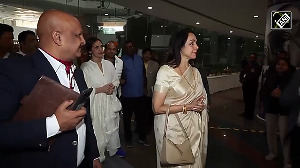Retired Commodore Uday Bhaskar, leading strategic analyst, has predicted that the Indo-US relationship 10 years into the future will still remain on track even if the bilateral civilian nuclear deal is not consummated because it is now driven largely by non-government actors.
During an interaction that followed his remarks on 10 Years After Pokhran II: Nuclear Stability in Southern Asia, at the Carnegie Endowment for International Peace -- a leading Washington think tank -- Bhaskar said a decade down the road he did not expect any major hiccups in the relationship "because much of the India-US relationship is now outside the government actually".
"To the extent, 10 years from now, irrespective of whether this particular agreement is going to be realised in its most normative way or not, the track remain the same," he said, reiterating that it was private sector driven.
According to Bhaskar, former head of the Institute for Defence Studies and Analyses and an authority on national security issues and currently the Convener of the India International Centre Study Group, "There are large levels of interaction, which may be at best regulated by the government, but they are not the drivers on both sides."
"And, therefore, I do not see that changing in a very major way at this point in time," he said.
Bhaskar said that "where the governments come into play is how they would define the intensity and the pace of the strategic and security cooperation, for which I still maintain that the June 2005 (India-US defence cooperation) agreement is an extraordinary agreement."
However, Bhaskar bemoaned that "given the nature of politics in India now, the fact that coalition are going to be the dominant pattern -- and the Left Parties will gain a major voice -- I see that there would be a certain blunting of those possibilities."
But, he stressed that "essentially the track remain the same, and I don't think there will be any major setback in terms of going back to pre-'98," when India exploded its nuclear weapons.
Bhaskar also declared that it were the May 1998 Pokhran II tests that "enabled July 2005. That's my point. It's just that we have had our own, I would say, domestic inadequacies in India, in terms of the assessment of what is it that we are prioritizing. Is it like -- the freedom to test and is that what is going to be the Indian national interest or would it be about what kind of vulnerabilities we have as far as the global nuclear commerce is concerned."
"So, that debate remains, I would say, unresolved within India even now as I speak," he said.
Asked pointedly by Henry Sokolski, head of the Nonproliferation Policy Education Center and a former Pentagon official who is part of the nonproliferation lobby in the US vehemently opposed to the US-India
"My own personal assessment, which is not totally uninformed," he said, "is that India can at this point live without testing for the next five years, caveat being that domain conditions remain reasonably stable in the next five years."
Bhaskar said, "That's the way I see it and I believe that we can stay within the ambit of credible minimum deterrence, which is what India's objective has been."
He also reminded Sokolski and others and other participating in the interaction who kept pointing to the BJP's opposition to the US-India nuclear accord as restraining India from future testing that "as you are aware, Brajesh Mishra, the former National Security Adviser had taken a public position, which was to say that the current arrangement as far as India is concerned after May 11, May 13(1998 Pokhran II tests ), is something that is adequate as far as India is concerned and its security considerations."
"You'll also recall that soon after May 1998, almost on the 13th," Bhaskar pointed out, "It was Mishra himself as the National Security Adviser, who had accepted the voluntary moratorium as far as the testing was concerned. And, that was based on a clear input, assessment, provided to the political establishment that India had enough in terms of the fallout of the tests to be able to move toward a credible and a minimum deterrent."
So, he said, "It was the BJP, led by (then Prime Minister Atal Bihari) Vajpayee who had come to this conclusion."
Bhaskar said that "within the BJP, there is one group that feels that the current agreement with the United States would in a way fetter, and if you heard BJP leader L K Advani recently in public, he makes a very sort of what I would call a dramatic rhetorical question. He asks audiences in rural India, Indira Gandhi carried out Pokhran I, Atal Bihari Vajpayee carried out Pokhran II. Now this government is about to ensure that there will never be a Pokhran III. What you think we should do?
And, Bhaskar said, "I mean, clearly what kind of a response would you get from an audience."
"Now that is a certain amount of what I would call as the way in which the issue is being packaged, but it is not -- and I want to underline that -- unanimous by the BJP on the subject. That India needs more testing."





